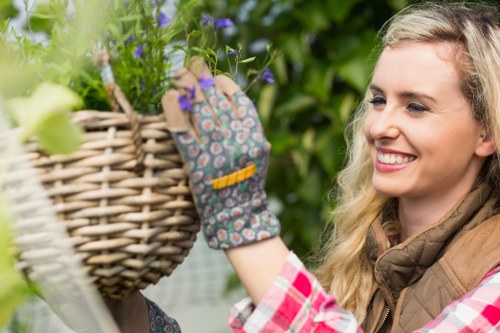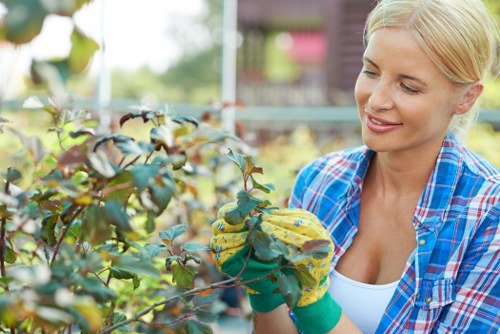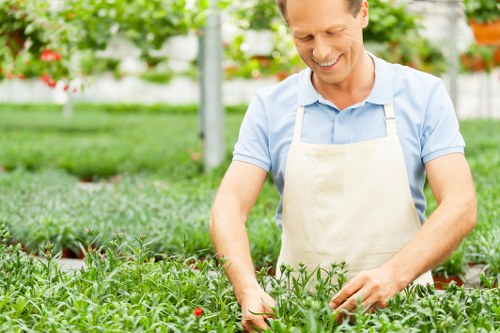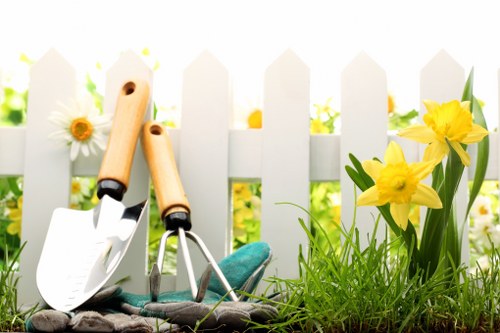Comprehensive Guide to Garden Maintenance in Fulham

Garden maintenance in Fulham is essential for ensuring that your outdoor space remains beautiful and functional throughout the year. Whether you have a sprawling garden or a modest courtyard, regular upkeep can make a significant difference in the health and appearance of your plants.
Fulham's unique climate and soil conditions require tailored gardening strategies. Understanding the local environment is crucial for effective garden maintenance.
In this article, we will explore various aspects of garden maintenance in Fulham, providing you with the knowledge and tools to keep your garden thriving.
Understanding Fulham's Climate and Soil

Fulham experiences a temperate maritime climate, characterized by mild winters and warm summers. This climate is generally favorable for a wide variety of plants, but it also presents specific challenges that gardeners must navigate.
The soil in Fulham varies, with some areas having rich, loamy soil while others may be more clay-heavy. Conducting a soil test is a recommended first step in effective garden maintenance.
By understanding your soil type, you can make informed decisions about plant selection, fertilization, and irrigation, ensuring optimal growth conditions.
Soil Testing and Preparation
Soil testing involves analyzing your garden's soil to determine its pH balance, nutrient content, and texture. This information is vital for selecting the right plants and amendments.
Preparing your soil may include adding organic matter such as compost, adjusting pH levels, and incorporating fertilizers to enhance fertility.
Proper soil preparation sets the foundation for a healthy garden, promoting robust plant growth and resilience against pests and diseases.

Seasonal Garden Maintenance Tasks
Maintaining a garden in Fulham involves a series of seasonal tasks that cater to the changing weather conditions and growth cycles of plants.
Spring is a critical time for planting, pruning, and preparing your garden beds for the growing season. Summer requires diligent watering, weeding, and pest control.
Autumn focuses on cleanup, composting, and preparing plants for the colder months, while winter involves protection strategies to safeguard your garden from frost and snow.
Spring Maintenance
During spring, gardeners should focus on planting new flowers and vegetables, pruning overgrown shrubs, and enriching the soil with compost or fertilizers.
It's also an ideal time to repair garden structures such as fences, trellises, and pathways, ensuring they are in good condition for the upcoming year.
Regular inspections for pest activity can help in early detection and management, preventing potential infestations.

Effective Watering Techniques
Proper watering is a cornerstone of successful garden maintenance. Overwatering can lead to root rot, while underwatering can stress plants and reduce growth.
Implementing efficient irrigation systems, such as drip irrigation or soaker hoses, can provide consistent moisture directly to the plant roots.
Monitoring soil moisture levels and adjusting watering schedules based on weather conditions ensures that plants receive the right amount of water.
Choosing the Right Irrigation System
Selecting an appropriate irrigation system depends on the size of your garden, types of plants, and water availability. Drip irrigation is ideal for gardens with diverse plantings, while sprinkler systems may be suitable for larger, uniform areas.
Automated systems with timers can enhance water efficiency by ensuring plants are watered at optimal times, reducing waste.
Regular maintenance of irrigation systems, including checking for leaks and blockages, is essential for their effective operation.

Pest and Disease Management
Managing pests and diseases is crucial for maintaining a healthy garden. Integrated Pest Management (IPM) strategies combine biological, cultural, and chemical methods to control pest populations.
Regular monitoring of plants helps in early detection of issues, allowing for timely intervention before problems escalate.
Using organic pesticides and encouraging beneficial insects can create a balanced ecosystem that naturally deters harmful pests.
Integrated Pest Management (IPM)
IPM focuses on long-term prevention and control of pests through a combination of techniques. These include habitat manipulation, biological control, and the use of resistant plant varieties.
By minimizing the use of chemical pesticides, IPM promotes a healthier garden environment and reduces the risk of pesticide resistance.
Educating yourself about common pests in Fulham can help in selecting the most effective management strategies for your garden.
Choosing the Right Plants for Fulham Gardens
Selecting plants that are well-suited to Fulham's climate and soil conditions can significantly reduce maintenance efforts and enhance garden beauty.
Native plants often require less water and are more resistant to local pests and diseases, making them an excellent choice for sustainable gardening.
Incorporating a mix of perennials and annuals can provide continuous color and interest throughout the seasons.
Perennials vs. Annuals
Perennials are plants that live for multiple years, providing lasting structure and consistency in your garden. They typically require less replanting and can thrive with proper maintenance.
Annuals, on the other hand, complete their life cycle in one growing season. They offer versatility and the opportunity to change the garden's appearance each year.
Balancing perennials and annuals ensures a dynamic garden that remains vibrant and diverse throughout the year.
Pruning and Trimming Techniques
Regular pruning and trimming are essential for maintaining the shape, health, and productivity of your plants.
Pruning removes dead or diseased branches, encourages new growth, and enhances air circulation within the plant canopy.
Different plants require specific pruning techniques, so understanding each plant's needs is vital for effective maintenance.
Tools and Best Practices
Using the right tools, such as sharp shears and pruning saws, ensures clean cuts that promote healthy healing of plants.
Pruning at the correct time of year, typically during the dormant season, minimizes stress on plants and encourages optimal growth in the following season.
Maintaining your tools by cleaning and sharpening them regularly can extend their lifespan and enhance their efficiency.
Mulching and Soil Health
Mulching is a valuable practice in garden maintenance that involves covering the soil with organic or inorganic materials.
Mulch helps retain soil moisture, suppress weeds, regulate soil temperature, and improve soil structure as it decomposes.
Choosing the right type of mulch, such as bark, straw, or compost, depends on your garden's specific needs and aesthetic preferences.
Benefits of Organic Mulch
Organic mulches, like wood chips and compost, enhance soil fertility by adding nutrients as they break down. They also support beneficial soil microorganisms and improve soil aeration.
Applying organic mulch in a thick layer can significantly reduce weed growth, minimizing the need for manual or chemical weed control.
Regular replenishment of organic mulch ensures continued benefits and maintains the desired garden appearance.
Lawn Care in Fulham
A well-maintained lawn is a key component of garden aesthetics. Proper lawn care involves mowing, fertilizing, aerating, and pest management.
Choosing grass varieties that are suited to Fulham's climate and soil conditions can reduce maintenance efforts and enhance lawn resilience.
Implementing sustainable lawn care practices, such as reducing water usage and minimizing chemical inputs, contributes to a healthier environment.
Mowing Techniques
Regular mowing encourages dense, healthy grass growth and prevents weeds from establishing. It's important to mow at the correct height, typically around 2.5 to 3 inches for most grass types.
Sharpening mower blades ensures clean cuts, reducing stress on the grass and minimizing damage.
Leaving grass clippings on the lawn, a practice known as grasscycling, can return valuable nutrients to the soil, enhancing lawn health.
Seasonal Planting and Gardening Tips
Adapting your gardening practices to the changing seasons ensures that your garden remains vibrant and healthy year-round.
Implementing seasonal planting schedules allows for the cultivation of crops and flowers that thrive at different times of the year.
Utilizing cover crops and seasonal ground covers can protect the soil during off-seasons and prepare it for future planting.
Winter Protection Strategies
Protecting your garden during winter involves strategies such as mulching, using frost blankets, and selecting winter-hardy plant varieties.
Bringing sensitive plants indoors or providing sheltered environments can prevent frost damage and extend their growing season.
Regularly removing debris and fallen leaves reduces the risk of pest infestations and disease during the colder months.
Utilizing Professional Garden Maintenance Services
While DIY garden maintenance is feasible, professional services can offer expertise and efficiency, especially for larger or more complex gardens.
Professional gardeners are equipped with the knowledge and tools to handle a wide range of maintenance tasks, from soil preparation to pest management.
Hiring a local garden maintenance service in Fulham ensures that your garden receives personalized care tailored to the specific conditions of the area.
Benefits of Hiring Professionals
Professionals bring experience and specialized skills that can enhance the overall health and appearance of your garden.
They can provide customized maintenance plans, ensuring that all aspects of your garden are addressed comprehensively.
Outsourcing gardening tasks allows you to enjoy a beautiful outdoor space without the time and effort required for intensive maintenance.
Sustainable Gardening Practices
Embracing sustainable gardening practices promotes environmental responsibility and contributes to the long-term health of your garden.
Techniques such as composting, rainwater harvesting, and using native plants reduce resource consumption and enhance garden sustainability.
Implementing eco-friendly practices not only benefits the environment but also creates a thriving garden ecosystem.
Composting and Soil Enrichment
Composting transforms kitchen scraps and garden waste into valuable soil amendments, enriching the nutrient content of your garden beds.
Using compost improves soil structure, enhances moisture retention, and provides a steady release of nutrients to plants.
Maintaining a composting system reduces garden waste and supports a circular, sustainable gardening approach.
Conclusion
Effective garden maintenance in Fulham requires a combination of knowledge, regular care, and sustainable practices. By understanding the local climate, soil conditions, and implementing strategic maintenance tasks, you can create and preserve a beautiful and healthy garden.
Whether you choose to undertake maintenance yourself or enlist professional services, the key is consistency and attention to detail. A well-maintained garden not only enhances the aesthetic appeal of your property but also provides a serene and inviting outdoor space for relaxation and enjoyment.
Ready to transform your garden? Contact us today to schedule a consultation and take the first step towards a thriving garden in Fulham!